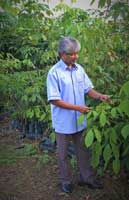
Instead of just limiting rubber trees’ use to manufacture latex surgical gloves – a necessity during the COVID-19 pandemic – or tyres, the Malaysian Rubber Board (MRB) has ventured to create a latex serum from locally-cloned transgenic rubber trees that could be developed into a cost-effective anti-dengue vaccine. Dengue fever is a disease that infects almost 400 million people worldwide each year and is Malaysia’s most prevalent infectious disease. While a local vaccine will tremendously help wipe out infections, the discovery could also “place the MRB, and Malaysia, prominently on the global pharmaceutical map.”
The breakthrough anti-dengue properties were discovered by MRB Lead scientist, Dr. E. Sunderasan, who was initially working on anti-cancer biochemicals from the latex serum extracted from conventional rubber trees. Dr. Sunderasan thought to use the latex serum – which was found to be undesirable as an anti-cancer drug – against other viruses, mindful of the prevalence of dengue fever in his home country.
Dr. Sunderasan has worked extensively on latex proteins and explained, “Tests showed that a protein from this latex serum could wipe out all the dengue virus population during the pre-infection stage. Additionally, we discovered that the serum prevented the virus from injecting genetic material into the host cells and could not infect host cells either,” he said. “This is a significant milestone as we are only left with the final test in the preclinical stage of drug development, that is, to see if the protein component can destroy the virus in living organisms’ cells.”
Currently, Dr. Sunderasan has applied for a RM300,000 (approx. US$68,700) grant from the MRB to complete the in-vivo test on living organisms.
Meanwhile, according to MRB Deputy director-general (Research & Innovations) Dr. Amir Hashim Md. Yatim, the development of a local vaccine would have substantial impact on Malaysia’s ability to combat endemic diseases. “This will mean we have the proverbial golden goose in our hands. We have many global innovative successes under our belt that have mainly been kept under wraps. But this will be a great success for MRB.”
Malaysia planted transgenic rubber trees back in 2012 – the mature trees can produce fine, “low-volume, high-value” chemicals with promising pharmaceutical agency. The public R&D organisation has so far successfully created transgenic rubber trees with three distinct pharmaceutical genes in its latex: a peptide hormone that has blood pressure-lowering activity; a peptide that has blood-clotting property; and a recombinant antibody that reacts to the bacteria that causes tooth decay.
Dr. Amir added that the transgenic rubber trees, which he describes as MRB’s treasure, along with other genetically modified plants are subject to biosafety regulations, i.e. a 20-year lease obtained from the National Biosafety Board. The trees are grown in a secure, confined plot for research and development purposes by MRB.
